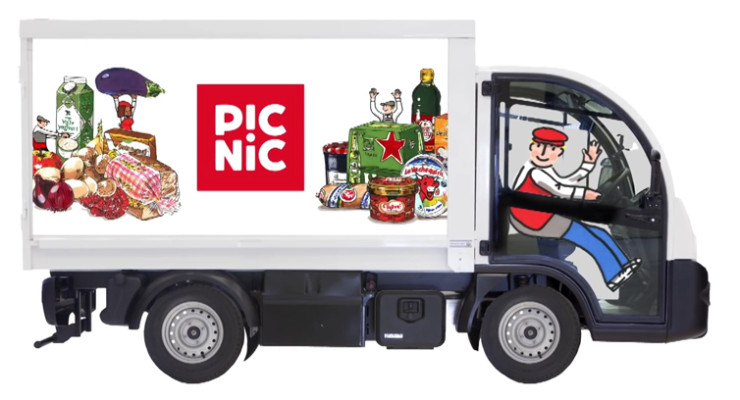Picnic – tapping into the comfort of platforms

Cars that drive themselves, a robot serving you at a restaurant, and even skyping someone over the phone while you are commuting. Ten years ago, many of these things were unimaginable. Now in some places they are a staple in society’s landscape. Our mediatised (western) society has become dependent on tools that promote comfort. Applications such as Uber, Airbnb, and Venmo are allowing consumer to enjoy basic services through an on-demand (or access) economy. Since 2017, The Netherlands has added their own addition to this market: Picnic, a supermarket-less store that delivers groceries to your door though an application.
Picnic’s workings
Picnic first hit the headlines globally when they racked up €100 million in funding for their idea (in comparison Uber managed to collect $37 million in the same process) (Oude Kotte). This put Picnic in the spotlights and subsequently has made their business model quite famous.
The milkman analogy is often used to describe Picnic’s operational model. While the milkman came to collect old milk bottles and replace them with new, filled ones; Picnic’s customers select the groceries they need in an app on their personal device and they are subsequently delivered to their home at a selected moment of their choice (Sterling).
The nature of selecting the groceries in an application means that the need for a physical supermarket is eliminated. The groceries are stored in a warehouse and collected for you. Picnic states that this allows the company to reinvest the money otherwise spent on rent and other related costs, into the development of their software and keeping the delivery service itself cost free.
The delivery service (much like the milk man) follows a set route. This ensures that the delivery times can be predicted more accurately (to a twenty-minute window) as the delivery van goes from door to door instead of driving across the city and back for multiple deliveries (van Tatenhove).
Platform Society
The evolution of these new media that influence our live are an example of the platformization that we endure nowadays. Platforms can be understood through different perspectives. However, one commonality that can be found is that they often function as an intermediary (Plantin, 2). This role entails that platforms position themselves between the client and the demand (Dijck et al., 28).
Picnic being a relatively new platform, has yet to become a key player in their market. Their presence as a platform currently closes the gap between the consumer and their need for ease when it comes to grocery shopping. However, as the company starts growing, the debate surrounding the platform industry becomes increasingly more important.
Corporate Social Responsibility
The CTO of Picnic has described picnic as a “tech company that operates as a food-logistics company” rather than an online supermarket. Being a platform that offer services and is described as “tech companies” rather than a supermarket, leaves the legal and ethical considerations hanging in a state of limbo (Dijck et al., 28). For example, if Picnic is classified a tech company, can the food safety be regulated to the same standard as a normal company? As platforms become an industry of their own, the development surrounding corporate social responsibility (CSR) is lagging. Not only are platforms expanding beyond the reach of the current understanding of CSR in existing markets, they are also developing into their own sector, which is unchartered territory for CSR (Taylor and Broerders, 230).
Social and corporate responsibility has caused much stir in the emerging platforms industry. Not only social responsibility issues such as the privacy of data and data management, but also more tangible issues such as the environment.
Ecological Footprint
In supermarkets the most attractive products are often placed at eye level. These are often more expensive than the options above or below (Kendall). Not only are the objects more expensive, but there is a whole list of things that could be improved about the product to reduce its ecological footprint.
Being sustainable has become vital in protecting a company’s reputation in the eyes of the public (Bonini). And many companies are using digital media to achieve that demand (Reilly and Hynan, 748). Picnic however has used their digital platform to come out ahead of the pack in this aspect, and even use it a selling point for their company. As the user shops through a digital interface, the flashy design of some products that you would find in a supermarket are not necessary. This give Picnic the opportunity to redesign products in a more sustainable manner (Oude Kotte).

The milk man analogy comes back when discussing the delivery service itself. Through the use of fixed routes, Picnic’s delivery vans do not need to drive more than they should, as all the stops are followed in the most logical and efficient order. This furthermore also gives consumers the opportunity to follow the delivery service in the mobile application to have an accurate guess of when the delivery service arrives, making the exchange even quicker (Van Tatenhove).
Datafication and Artificial Intelligence
Lastly, the user’s interaction with the platform is the crux of their business model. Picnic in 2017 substituted their “mobile first” operational model for one that was based on artificial intelligence (Dieleman). This operational model uses the data delivered by the platform to increase efficiency of their service (Choo).
As Van Dijck et al. highlight in their book The Platform Society, this is called datafication. Platforms are able to collect data from their users and organize the information to create new insights into their user’s habits. The use of artificial intelligence in this process helps companies such as Picnic learn even more about the deeper meta-data that is produced. (Van Dijck et al., 33)
Datafication poses a string of issues considering privacy and security. However, in combination with artificial intelligence these questions might have to be looked at even more seriously. Picnic is looking to accommodate people and make their experience with their company a comfortable one (Choo). The question however remains, at what cost does this innovation and comfort come?
The Future
That Picnic has taken the definition of supermarkets and futurized it is undisputable. But taking a cautious and sceptical look at the implications of their innovative platform is what is ultimately going to decide the success. And who knows, maybe the need for supermarkets will disappear altogether.
Work Cited
Bonini, Sheila. McKinsey on Sustainability & Resource Productivity. 2012, https://www.mckinsey.com/client_service/sustainability/latest_thinking/~/media/5E14ED58049D44148B5A47C0124A7E66.ashx.
Choo, Julie. “Building an AI Operating Model with Daniel Gebler from Picnic.” The Strategy Journey, 8 May 2018, https://strategyjourney.com/2017/08/16/ai-operating-model-daniel-gebler-picnic/.
Dieleman, Christel. “Picnic Stapt over Van Mobile First Naar Ai.” Computable.nl, 24 Oct. 2017, https://www.computable.nl/artikel/nieuws/digital-innovation/6230722/250449/picnic-stapt-over-van-mobile-first-naar-ai.html.
Dijck, José van, Poell, Thomas, and Waal, Martijn de. The Platform Society : Public Values in a Connective World . New York, NY: Oxford University Press, 2018. Print.
Kendall, Graham. “The Science That Makes Us Spend More in Supermarkets, and Feel Good While We Do It.” The Conversation, 4 Mar. 2014, https://theconversation.com/the-science-that-makes-us-spend-more-in-supermarkets-and-feel-good-while-we-do-it-23857.
Oude Kotte, Dieter. “Picnic.” I Amsterdam, https://www.iamsterdam.com/en/business/key-sectors/ict/testimonials/picnic.
Plantin, Jean-Christophe, et al. “Review Essay: How Platforms Shape Public Values and Public Discourse.” Media, Culture & Society, vol. 41, no. 2, SAGE Publications, Mar. 2019, pp. 252–57, doi:10.1177/0163443718818378.
Reilly, Anne H., and Hynan, Katherine A. “Corporate Communication, Sustainability, and Social Media: It’s Not Easy (really) Being Green.” Business Horizons, vol. 57, no. 6, Elsevier Inc., 2014, pp. 747–58, doi:10.1016/j.bushor.2014.07.008.
Sterling, Toby. “Startup Picnic Runs Grocery Delivery Bus in Dutch Online Shopping Boom.” Reuters, Thomson Reuters, 21 Sept. 2018, https://www.reuters.com/article/us-netherlands-grocery-internet/startup-picnic-runs-grocery-delivery-bus-in-dutch-online-shopping-boom-idUSKCN1LZ244.
Tatenhove, Joris van. “Picnic: the Modern Milkman Transforming Urban Distribution.” Medium, 18 Jan. 2019, https://medium.com/lifes-a-picnic/picnic-the-modern-milkman-transforming-urban-distribution-bae975749a12.
Tauber, Alejandro. “Dutch Grocery Delivery Startup Picnic Picks up Historic €100mm Funding Round after Only 1.5 Years.” The Next Web, 30 Mar. 2017, https://thenextweb.com/eu/2017/03/28/grocery-delivery-picnic-100mm-funding-round/.
Taylor, Linnet, and Broeders, Dennis. “In the Name of Development: Power, Profit and the Datafication of the Global South.” Geoforum 64 (2015): 229–237. Web.